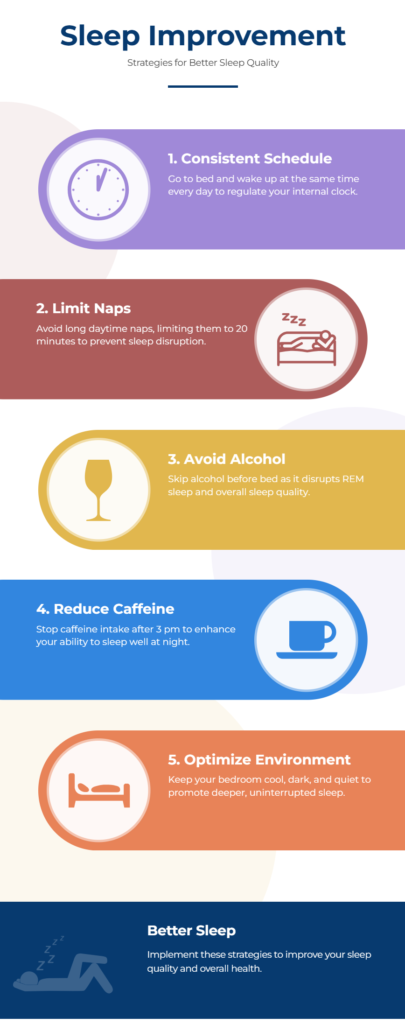Don’t miss a post. Click here to sign up for our free newsletter.
Estimated reading time: 8 minutes
The Power of Sleep: How It Affects Your Wellness and Happiness
Sleep is one of the foundational pillars of health and well-being, yet it often takes a back seat in today’s fast-paced, productivity-driven world.
We’ve all heard the phrase, “I’ll sleep when I’m dead,” but the irony is that lack of sleep can negatively impact our health, happiness, and longevity. Sleep isn’t just a luxury; it’s an essential biological process that plays a crucial role in how we recover, repair, and function daily.
In this post, we’ll explore how improving sleep quality can be transformative for your health, mood, fitness, and mental clarity, along with practical steps you can take to optimize your rest.
Harness the power of sleep!
The Role of Sleep in Wellness
At the core of good health lies the quality of our sleep.
It’s during sleep that our bodies perform vital functions that simply can’t be achieved when we’re awake. For example, sleep is when the brain clears out toxins accumulated during the day, and muscles repair and grow after exercise. It’s also when our immune system kicks into high gear, supporting everything from fighting off infections to improving cell regeneration.
Key Benefits of Sleep for Your Well-Being:
- Physical Recovery and Growth: Whether you’re lifting weights, running, or doing yoga, your muscles only grow and repair when you’re at rest. This is why athletes prioritize sleep to enhance performance.
- Cognitive Functions: Sleep is essential for memory consolidation and cognitive functioning. If you’ve ever struggled to remember something after a bad night of sleep, you know how much rest impacts brainpower.
- Emotional Regulation: Our ability to manage emotions is deeply tied to our sleep patterns. Without proper rest, we’re more likely to be irritable, anxious, and less able to cope with stress.
- Weight Management and Metabolism: One of the most overlooked aspects of sleep is its direct influence on appetite and metabolism. Poor sleep can wreak havoc on your hunger hormones, leading to overeating and cravings for unhealthy foods.
The Consequences of Poor Sleep
Sleep deprivation has ripple effects that go beyond simply feeling groggy the next day. Chronic poor sleep has been linked to serious health conditions, such as cardiovascular disease, diabetes, and obesity. But even short-term disturbances can dramatically impact your fitness and wellness goals.
Here’s what happens when you don’t get enough quality sleep:
- Energy Levels Plummet: One of the most immediate effects of poor sleep is fatigue. This lack of energy makes it difficult to stick to exercise routines, follow through on daily plans, or even get through the day.
- Mood and Willpower Drop: With inadequate sleep, it becomes harder to manage emotions, leading to irritability and frustration. Moreover, reduced willpower can derail diet and fitness goals, leaving you feeling unmotivated.
- Appetite and Metabolism Get Disrupted: Sleep deprivation causes an increase in the hormone ghrelin (which stimulates hunger) and a decrease in leptin (which signals fullness). This imbalance can lead to overeating, particularly cravings for high-calorie, sugary foods.
- Fitness Goals are Compromised: Inadequate rest makes it harder for the body to recover from workouts, slowing progress toward strength gains or weight loss.
- Cognitive Functions Suffer: Lack of sleep can impair concentration, problem-solving skills, and creativity, making work and life tasks more difficult to manage.
Steps to Improve Your Sleep Quality
The good news is that you can take several actions to improve the quality of your sleep. These small changes can significantly affect how rested and refreshed you feel. Here are some research-backed strategies to enhance your sleep:
1. Establish a Consistent Sleep Schedule
Our bodies thrive on routine. One of the most important steps to better sleep is going to bed and waking up at the same time every day—even on weekends. This consistency helps regulate your internal clock, making it easier to fall asleep and wake up naturally. While falling asleep at the same time is important, the most critical factor is waking up at the same time each morning.
A study published in the journal Sleep Health found that irregular sleep patterns are associated with higher risks of metabolic syndrome, a group of conditions that increase the risk of heart disease and diabetes. Sticking to a consistent schedule, particularly waking up at the same time, helps reduce this risk.
2. Limit Daytime Napping
While naps can offer a quick energy boost, long naps can disrupt your nighttime sleep cycle. If you need to nap, limit it to no more than 20 minutes, and try to nap earlier in the day.
According to a study by the National Sleep Foundation, naps longer than 20-30 minutes can lead to sleep inertia—feeling groggy and disoriented upon waking—making it harder to sleep well at night.
3. Skip Alcohol Before Bed
Although alcohol can initially make you feel sleepy, it interferes with the quality of your sleep. Alcohol disrupts REM (Rapid Eye Movement) sleep, the stage when dreaming occurs, and the brain rejuvenates itself.
The Journal of Clinical Sleep Medicine reports that alcohol reduces overall sleep quality by reducing the time spent in REM sleep, leading to increased tiredness the next day.
4. Limit Caffeine Intake
Caffeine is a stimulant that can stay in your system for up to six hours. While a morning coffee might boost productivity, consuming caffeine later in the day can disrupt your sleep. Stop drinking coffee or any caffeinated beverages after 3 pm to ensure a more restful night.
A study published in the Journal of Clinical Sleep Medicine found that caffeine consumed even six hours before bed can significantly reduce sleep quality, leading to shorter sleep duration and more awakenings during the night.
5. Optimize Your Sleep Environment
Your sleep environment plays a significant role in the quality of your rest. Make your bedroom as comfortable as possible by keeping it cool (60-67°F is ideal), quiet, and dark. Consider using blackout curtains, eye shades, or even earplugs if external noise or light interferes with your sleep.
The American Academy of Sleep Medicine recommends creating a cool, dark, and quiet bedroom environment to promote deeper, uninterrupted sleep, which helps facilitate the body’s natural recovery processes.
6. Ditch the Electronics
Blue light from phones, tablets, and laptops can interfere with the production of melatonin, the hormone responsible for regulating sleep. Avoid using electronics at least one hour before bedtime. If you must use your devices, consider enabling night mode or using blue light-blocking glasses. Make your bedroom a phone-free zone!
A study from Harvard Medical School found that blue light exposure in the evening suppresses melatonin production and shifts the circadian clock, making it harder to fall asleep and stay asleep.
7. Mind Your Meals
Eating a heavy meal right before bed can make falling asleep more difficult. If your schedule allows, aim to eat dinner at least three hours before going to bed to allow proper digestion.
Research published in the Journal of Clinical Endocrinology & Metabolism shows that eating late can negatively impact metabolism and increase the risk of obesity and other metabolic disorders. Having your last meal earlier in the evening helps with digestion and improves sleep quality.
8. Incorporate a Wind-Down Routine
Develop a pre-bedtime routine that signals to your body that it’s time to relax. This could include activities like light reading, practicing mindfulness, doing gentle stretches, or listening to soothing music.
A study in the Journal of Sleep Research indicates that relaxation techniques such as mindfulness meditation can significantly improve sleep quality, particularly for those who suffer from insomnia or anxiety.
The Growing Trend of Sleep Optimization
In recent years, there’s been a significant shift in how we view sleep, with more people recognizing its importance to overall health. The rise of sleep-tracking technology—such as wearable devices that monitor sleep stages, duration, and quality—reflects this growing awareness. These tools can help individuals gain insights into their sleep patterns and make more informed decisions about how to improve rest.
New Trends in Sleep Health:
- Sleep Gadgets: From smart mattresses to white noise machines and sleep apps, technology is evolving to help optimize sleep quality.
- Nutritional Supplements: Some people turn to natural sleep aids like melatonin or magnesium to support better sleep.
- Corporate Sleep Programs: Many organizations are beginning to realize the impact of sleep on productivity and well-being, offering employees access to nap rooms or sleep health seminars.
Let’s Continue the Conversation
Improving sleep is a journey, and what works for one person may not work for another. Have you found a specific strategy that enhances your sleep? Are there areas where you struggle to get quality rest? Share your thoughts, questions, or experiences in the comments below!
Sleep is often the missing piece in our wellness routines, but by prioritizing it and making small adjustments to our habits, we can unlock a healthier, happier, and more energized life. If you’d like to dive deeper into this topic or need personalized support, feel free to reach out—we’re here to help you achieve your wellness goals!
👉 Start today!
Check out The Seven Pillars of Sustainable Health and Wellness, an introduction to our overall wellness coaching strategy.
Subscribe to our free newsletter to receive more health tips right in your inbox, or schedule a free 30-minute 1:1 call for a personal consultation.
The Power of Sleep: How It Affects Your Wellness and Happiness | Cheat Sheet

